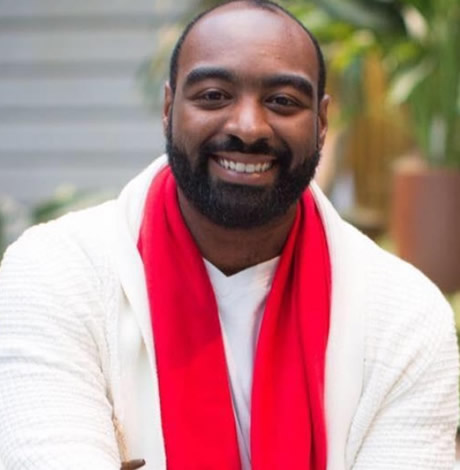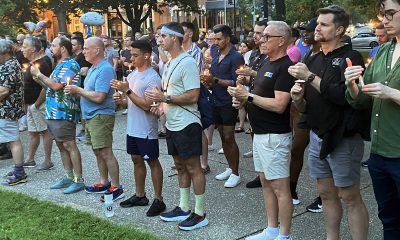Sports
All stars spotlight: Stonewall Dodgeball
Local player finds career parallels in recreational league


Mark Covington, left, and Derek Jansante. (Photos courtesy the subjects)
This week in the ongoing All-Star series on the LGBT sports community, we meet two long-time Stonewall Dodgeball players.
Stonewall Dodgeball launched in the spring of 2014 and is currently running multiple seasons of its league at the Washington D.C. Jewish Community Center. Its winter season will kick-off Jan. 21 and this weekend members will field teams at the Sin City Classic in Las Vegas.
Mark Covington didn’t play sports growing up in Winston-Salem, N.C. He says he was a big musical theater nerd all the way through receiving his first degree at Wake Forest University. He moved to D.C. in 2014 and a friend suggested he give dodgeball a try.
“Dodgeball can be a tough space and it takes a lot of courage for a black LGBT man to maneuver through it. Even though I am one of a very few, I have found acceptance and have learned a lot about the community,” Covington says. “I come from a small town and it feels great to be out and proud in this space. It normalizes everything.”
Covington received his graduate degree from George Washington and is working in mental health counseling. After four years of playing dodgeball he has found a correlation between his profession and his sport.
“Dodgeball is very fast and it keeps you on your toes. You always have to know where the ball is, and which way people are moving,” Covington says. “I develop awareness with my clients, so it fits in with my work and forces me to be present.”
He is currently working on his Ph.D. at George Washington University and often leans on his fellow players as a source of support.
“I have met a lot of new friends and developed friendships that help me get through life,” Covington says. “I am still learning how to be comfortable in my own skin.”
Derek Jansante had a decision to make when facing his college path. He had an opportunity to play college baseball as a pitcher at a Division III university, but was uncertain that he would be accepted in a rural setting as a gay athlete. Jansante decided instead to attend Stetson University with the hope of being himself.
Growing up in Bentleyville, Pa., Jansante played sports year round including baseball, basketball and golf in high school. While he was at Stetson, he served as student body president and played intramural volleyball, dodgeball and baseball.
He moved to D.C. in 2011 to work with the Victory Fund and joined Stonewall Dodgeball in its first season as a free agent. Along the way he has also played with Stonewall Kickball and the D.C. Gay Flag Football League.
“Throwing hard in a small space is one of the skills I acquired from being a baseball pitcher,” Jansante says. “Playing dodgeball allows me to tap into that skillset.”
Jansante is now working as an academic advisor at American University and wrapped up his graduate work at George Washington University in 2016. His love for his sport almost interrupted that path.
“I love dodgeball so much, that I almost took a semester off grad school to play,” Jansante says. “There is broad acceptance and an incredible community aspect. My dodgeball teammates are my best friends.”

More than a dozen LGBTQ athletes won medals at the Milan Cortina Winter Olympics that ended on Sunday.
Cayla Barnes, Hilary Knight, and Alex Carpenter are LGBTQ members of the U.S. women’s hockey team that won a gold medal after they defeated Canada in overtime. Knight the day before the Feb. 19 match proposed to her girlfriend, Brittany Bowe, an Olympic speed skater.
French ice dancer Guillaume Cizeron, who is gay, and his partner Laurence Fournier Beaudry won gold. American alpine skier Breezy Johnson, who is bisexual, won gold in the women’s downhill. Amber Glenn, who identifies as bisexual and pansexual, was part of the American figure skating team that won gold in the team event.
Swiss freestyle skier Mathilde Gremaud, who is in a relationship with Vali Höll, an Austrian mountain biker, won gold in women’s freeski slopestyle.
Bruce Mouat, who is the captain of the British curling team that won a silver medal, is gay. Six members of the Canadian women’s hockey team — Emily Clark, Erin Ambrose, Emerance Maschmeyer, Brianne Jenner, Laura Stacey, and Marie-Philip Poulin — that won silver are LGBTQ.
Swedish freestyle skier Sandra Naeslund, who is a lesbian, won a bronze medal in ski cross.
Belgian speed skater Tineke den Dulk, who is bisexual, was part of her country’s mixed 2000-meter relay that won bronze. Canadian ice dancer Paul Poirier, who is gay, and his partner, Piper Gilles, won bronze.
Laura Zimmermann, who is queer, is a member of the Swiss women’s hockey team that won bronze when they defeated Sweden.
Outsports.com notes all of the LGBTQ Olympians who competed at the games and who medaled.
Sports
US wins Olympic gold medal in women’s hockey
Team captain Hilary Knight proposed to girlfriend on Wednesday

The U.S. women’s hockey team on Thursday won a gold medal at the Milan Cortina Winter Olympics.
Team USA defeated Canada 2-1 in overtime. The game took place a day after Team USA captain Hilary Knight proposed to her girlfriend, Brittany Bowe, an Olympic speed skater.
Cayla Barnes and Alex Carpenter — Knight’s teammates — are also LGBTQ. They are among the more than 40 openly LGBTQ athletes who are competing in the games.
The Olympics will end on Sunday.
Sports
Attitude! French ice dancers nail ‘Vogue’ routine
Cizeron and Fournier Beaudry strike a pose in memorable Olympics performance

Madonna’s presence is being felt at the Olympic Games in Italy.
Guillaume Cizeron and his rhythm ice dancing partner Laurence Fournier Beaudry of France performed a flawless skate to Madonna’s “Vogue” and “Rescue Me” on Monday.
The duo scored an impressive 90.18 for their effort, the best score of the night.
“We’ve been working hard the whole season to get over 90, so it was nice to see the score on the screen,” Fournier Beaudry told Olympics.com. “But first of all, just coming out off the ice, we were very happy about what we delivered and the pleasure we had out there. With the energy of the crowd, it was really amazing.”
Watch the routine on YouTube here.
-

 India5 days ago
India5 days agoActivists push for better counting of transgender Indians in 2026 Census
-

 District of Columbia4 days ago
District of Columbia4 days agoCapital Pride reveals 2026 theme
-

 Advice4 days ago
Advice4 days agoDry January has isolated me from my friends
-

 National4 days ago
National4 days agoAfter layoffs at Advocate, parent company acquires ‘Them’ from Conde Nast



















